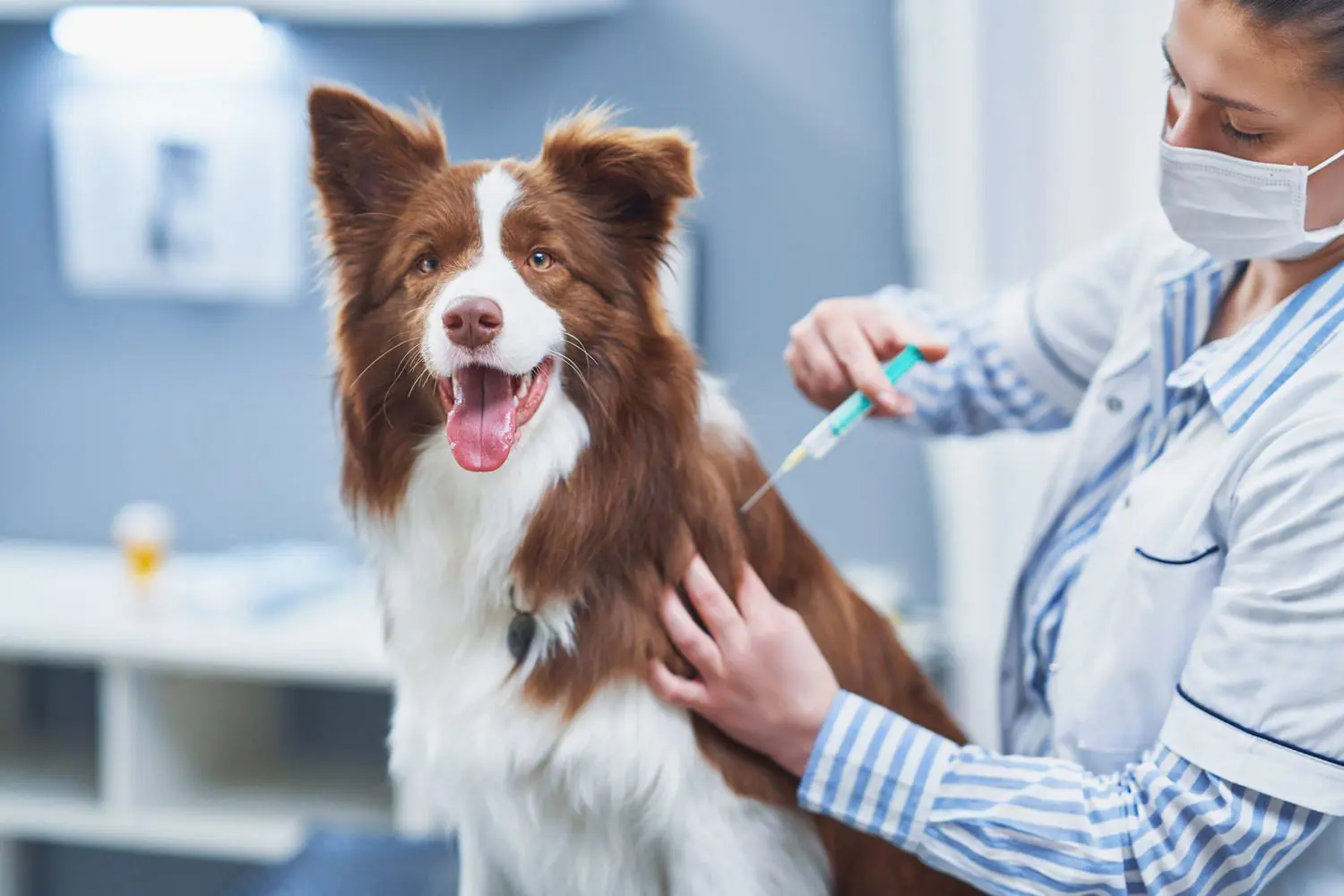Rabies Vaccination for Dogs: Everything You Need to Know to Keep Your Dog Safe

Keeping your dog healthy goes beyond just good food and exercise. Vaccination is a crucial part of responsible pet ownership, and one of the most important vaccines your dog needs is for rabies.
This article will provide all the information you need to understand rabies, the importance of vaccination, and how to keep your furry friend protected.
Understanding Rabies
Rabies is a deadly viral disease that affects the nervous system of mammals, including dogs and humans. It's primarily transmitted through the saliva of infected animals, typically through bites.
The rabies virus travels from the site of the bite to the brain, where it causes severe inflammation. Once symptoms appear, rabies is almost always fatal, making prevention crucial.
Rabies has a long and frightening history. It's been recognized for thousands of years, and even with modern medicine, it remains a serious public health issue in many parts of the world.
The virus can be found on every continent except Antarctica, and despite significant advances in control and prevention, it still claims thousands of human and animal lives each year.
Why Vaccinate Your Dog?
Protecting Your Dog
Vaccination is the single most effective way to prevent rabies in dogs. Once a dog is infected, the disease is invariably fatal.
However, a vaccinated dog has a strong defense against the virus, greatly reducing the risk of infection.
Protecting Public Health
Rabies vaccination plays a vital role in public health by stopping the spread of the virus. Dogs are the primary source of rabies transmission to humans, accounting for the majority of human rabies cases worldwide.
By vaccinating dogs, we create a barrier that helps protect humans from this deadly disease.
Legal Requirements
In many areas, rabies vaccination is legally required for dogs to be licensed. This is because rabies poses a significant risk to public health, and ensuring that all dogs are vaccinated is a key strategy in controlling the spread of the virus.
Failure to comply with rabies vaccination laws can result in fines, quarantine, or even euthanasia of the unvaccinated dog if it bites someone.
Types of Rabies Vaccines
There are two main types of rabies vaccines available for dogs:
Killed Virus Vaccines
Killed virus vaccines are the most common type. These vaccines contain an inactivated form of the rabies virus. The virus is "killed" so it cannot cause the disease, but it can still stimulate the dog's immune system to produce antibodies.
These antibodies will recognize and fight off the real virus if the dog is ever exposed.
Recombinant Vaccines
Recombinant vaccines are a newer type of rabies vaccine.
These vaccines use genetic engineering to create a specific part of the rabies virus that triggers an immune response. Because they only use a part of the virus, they cannot cause the disease. Recombinant vaccines are highly effective and are considered very safe.
Both types of vaccines are highly effective in preventing rabies. Your veterinarian will recommend the best option for your dog based on factors like age, health status, and local regulations.
Vaccination Schedule
The recommended vaccination schedule for dogs can vary depending on local regulations and your veterinarian's advice. Here's a general guideline:
Puppies
The first rabies vaccination is typically given between 12 and 16 weeks of age. This is because young puppies have immature immune systems, and earlier vaccination may not be effective.
Booster Shots
The initial vaccination is followed by a booster shot one year later. After that, boosters are typically required every one to three years, depending on the vaccine used and local regulations.
Some vaccines are approved for three years of protection, while others require annual boosters.
Keeping Track
It's important to keep track of your dog's vaccination schedule and ensure they receive their boosters on time. Many veterinarians provide reminders, but it's a good idea to mark the dates on your calendar as well.
Vaccine Administration and Safety
Administration
Rabies vaccines are administered by a veterinarian through a simple injection, usually given under the skin or into the muscle. The injection process is quick and typically causes minimal discomfort to the dog.
Common Side Effects
Common side effects of the rabies vaccine are mild and may include temporary soreness at the injection site, slight fever, or reduced appetite. These side effects usually resolve within a day or two.
Serious Reactions
Serious reactions to the rabies vaccine are extremely rare. These can include allergic reactions such as swelling, hives, or difficulty breathing. If your dog shows any signs of a serious reaction, contact your veterinarian immediately. The benefits of vaccination far outweigh the risks, as the rabies vaccine is very safe and effective.
Traveling with Your Vaccinated Dog
Domestic Travel
If you plan to travel with your dog within your country, rabies vaccination is often a requirement. Many states and regions have specific rules regarding the timing of the most recent booster, and some may require additional paperwork, such as a health certificate.
International Travel
International travel with your dog requires even more preparation. Different countries have different entry requirements for pets, and many require proof of rabies vaccination. Some countries may also require a rabies titer test, which measures the level of rabies antibodies in your dog's blood to ensure adequate immunity. Make sure to check the specific requirements well in advance of your trip to avoid any travel disruptions.
Frequently Asked Questions
- Is the Rabies Vaccine Safe?
Yes, rabies vaccines are very safe and effective. Millions of dogs are vaccinated each year with very few adverse reactions. The benefits of vaccination far outweigh the risks, as the disease itself is almost always fatal once symptoms appear. - Can My Dog Still Get Rabies If Vaccinated?
While highly unlikely, even vaccinated pets can theoretically contract rabies if exposed to a high enough dose of the virus. However, vaccination significantly reduces the risk and often prevents symptoms from developing. It's important to maintain up-to-date vaccinations and avoid exposing your dog to potentially rabid animals. - Where Can I Get My Dog Vaccinated?
Only licensed veterinarians can administer rabies vaccines. Your local veterinary clinic will have the vaccine and can ensure that your dog is vaccinated according to the latest guidelines and regulations. - What If My Dog Is Overdue for a Rabies Vaccine?
If your dog is overdue for a rabies vaccine, contact your veterinarian as soon as possible to schedule an appointment. While a short delay may not significantly increase the risk, it's important to keep your dog's vaccinations current to ensure continuous protection. - Can Puppies Be Vaccinated for Rabies Before 12 Weeks?
Rabies vaccination is typically recommended between 12 and 16 weeks of age. Vaccinating earlier is not generally recommended because the maternal antibodies present in young puppies can interfere with the vaccine's effectiveness. Your veterinarian can provide the best advice for your specific situation.
Conclusion
Rabies is a serious and preventable disease. Vaccination is the key to keeping your dog healthy and protecting yourself and your community. By ensuring your dog is vaccinated, you are taking an important step in responsible pet ownership.
Vaccinating your dog not only protects them but also helps to protect other pets and humans in your community. It's a critical component of public health efforts to control and eventually eradicate rabies.
Talk to your veterinarian about the best rabies prevention plan for your dog and ensure they are up-to-date on their vaccinations. By working together, we can keep rabies a thing of the past.
Remember to maintain records of your dog's vaccinations, stay informed about local laws and regulations, and prioritize your pet's health and safety.
Taking these steps will help ensure that your furry friend remains healthy and happy, and that rabies stays a distant threat, rather than a present danger.
Top Lists






